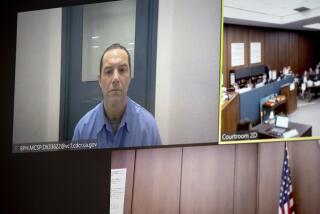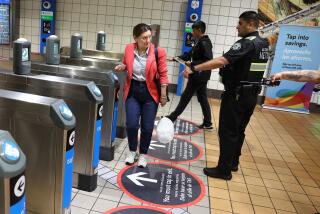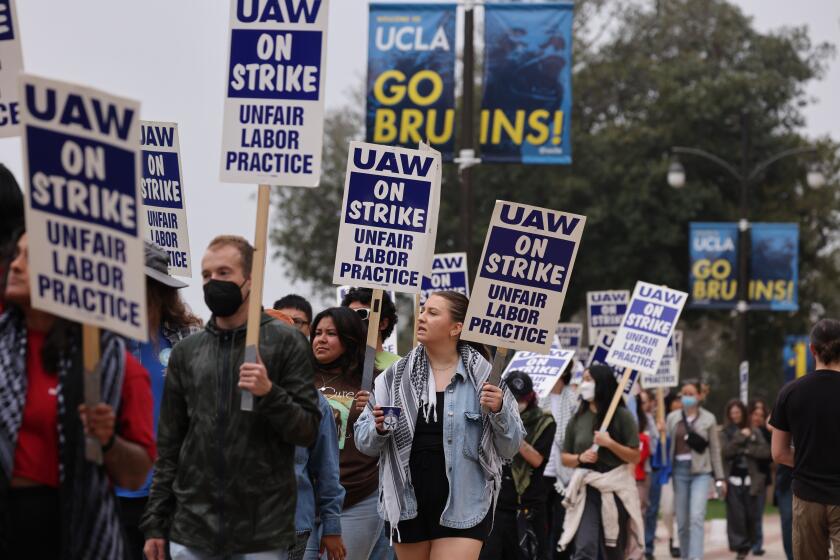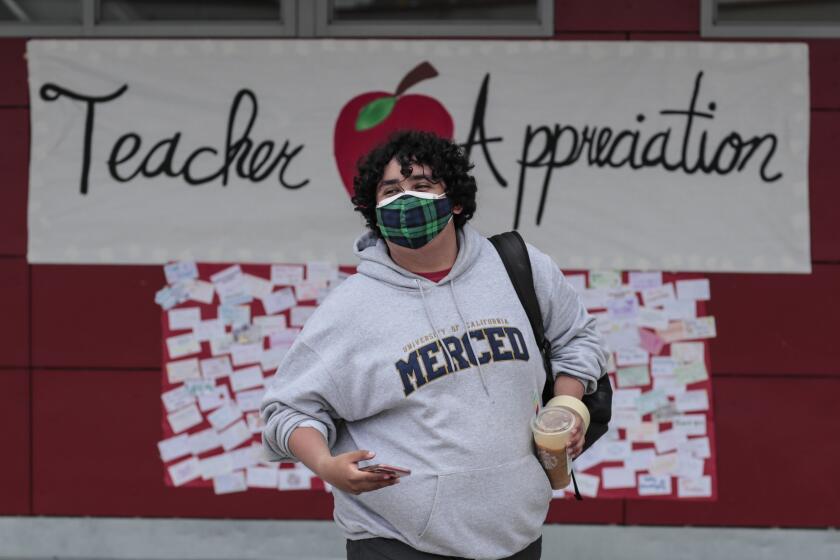Teachers at State-Run Schools Seek Pay Parity
The state-run California School for the Deaf in Riverside had a perfect candidate for a job opening: a speech therapist with expertise in American Sign Language.
She was immediately hired and was on the job for just two weeks when she got a last-minute job offer from a public school district for $10,000 more per year.
“And poof, she was gone,” said Pat Melvin, a fourth-grade science and social studies teacher who has worked at the school for 14 years. “That quality and level of person is hard to find.”
Turnover at the Riverside school and other state-run schools is a continual problem.
The 1,889 state teachers and librarians who work at detention and rehabilitation centers, and schools for the deaf, blind, developmentally disabled and mentally ill, make an average of 26% less than their public school counterparts, according to the California State Employees Assn.
School administrators said it was difficult to recruit and retain qualified teachers for students with special needs when those teachers could make $7,000 to $10,000 more per year “just by walking across the street.”
“Here’s where they should be, but they go elsewhere for more money,” said Shelly Rempe, principal of the special needs department at the School for the Deaf in Riverside, where children from infants to 12th-graders are taught. “There’s not much we can do if someone says they got another offer. We have a very set, finite amount of money in our budget.”
Teachers at California’s two residential schools for the deaf, the one in Riverside and another in Fremont, in the Bay Area, said they felt insulted because they make less money, even though they are bilingual, hold multiple credentials and have master’s degrees.
Melvin, who used to be a district bargaining unit representative, put the issue in simple terms: “We need parity pay.”
Because the schools are state agencies, their funding is approved by the Legislature and often gets tangled in the political battle over the budget, which is especially bitter this year after Gov. Arnold Schwarzenegger borrowed $2 billion from the education budget that teachers unions say he won’t pay back.
“We are at the mercy of the budget of the state of California,” said Harold Kund, superintendent of the 480-student Riverside school. “If the state is in crisis, so are we.”
The annual base salary for first-year teachers at the School for the Deaf in Riverside is $40,056, compared with $41,454 at the Riverside Unified School District -- nearly 3.5% less.
At the School for the Deaf in Fremont, entry-level teachers make $46,068 compared with $47,247 at the Fremont Unified School District -- 2.5% less.
As teachers gain experience and ascend the pay scale, the gap widens.
At Riverside’s School for the Deaf, teachers peak at $64,224 while their local counterparts can make up to $80,760, or nearly 26% more; in Fremont, state teachers can make $71,964 versus $86,051 at the local district, more than a 19% difference. “We would like to have our teachers’ skills recognized,” said Henry Klopping, superintendent of the Fremont school.
“We’d like to have our teachers paid at least what the public schoolteachers get paid.”
Joe Finnegan, executive director of the Conference of Educational Administrators of Schools and Programs for the Deaf, said pay disparity for special needs teachers is not a nationwide problem, but does exist in some areas.
Like California, teachers employed in the Northeast are not earning the same as teachers with similar credentials in the local schools, Finnegan said.
But at the South Carolina School for the Deaf and Blind, the pay is tied to what the local teachers make, he said.”We get this question a lot, because schools are trying to justify their requests for more money,” said Finnegan, whose national organization represents schools and educational programs involved with the education of the deaf and hard of hearing.
Salaries for public schoolteachers are determined by local school boards and bargaining units, said Ronald Kadish,director of the California Department of Education’s special schools and services division.
Salaries for state employees are handled through collective bargaining agreements between the state Department of Personnel Administration and local unions.
In 2001, then-Assemblyman John Dutra (D-Fremont) introduced legislation that would have required the department to make salaries for various state employees competitive with public school systems in the same city and district.
When former Gov. Gray Davis vetoed the bill, Dutra introduced compromise legislation in 2002 that asked state education officials to “consider” salary parity. The bill passed, but it has been useless, Klopping said.
Teachers at the schools for the deaf are grouped with the bargaining unit of the California State Employees Assn. which represents teachers and librarians. Because the teachers at the schools for the deaf are outnumbered more than 3 to 1 by teachers at the correctional facilities, some believe that their concerns about pay are ignored.
“We always have a struggle with the larger segment of the bargaining unit,” Kund said. “They are more worried about security and things like that.”
But Cindie Fonseca, a district bargaining representative for the union, said the concerns from all members are taken into consideration.
“It’s the pay parity issue that is universal for all the teachers,” Fonseca said.
But even without competitive pay, some teachers in Riverside said they wouldn’t want to work anywhere else.
For Janelle Green, a teacher for infants and toddlers, the Riverside school matched her education philosophy -- that children who are deaf should be taught using American Sign Language.
She was willing to take a $2,000 pay cut to do the same job she was doing for the Burbank Unified School District.
“It’s hard to know that I’m doing something for less money than I would get somewhere else,” said Green, whose interest in deafness began when she became friends with a deaf girl in the third grade. “But I wouldn’t want to be anywhere else. It’s a worthy sacrifice.”
Kund said a lot of his staff shared that sentiment.
“Our school is a real draw,” he said. “[Teachers] will work here for less money because there are other intrinsic benefits that come along with it.”
Nonetheless, the union bargaining unit, which has been without a contract for two years, is heading for negotiations in Sacramento on Monday. Pay parity is the No. 1 issue.
“No matter how good or how convincing our [salary] research, if there’s no necessity on the state’s part to respond, they’ll just keep handing us rejections,” said Fonseca, a printing and graphic arts teacher at the California Rehabilitation Center in Norco. “It doesn’t make sense. They just look at you and say, ‘Uh-huh, uh-huh, uh-huh. We don’t have the money.’ ”
Teachers at the schools for the deaf did receive 5% raises two years ago, but no extra money to fund them.
The raises had to come out of their budget for supplies, field trips and new hires.
“Our schools have had to make cuts to pay for that increase,” Kadish said.
More to Read
More to Read
Start your day right
Sign up for Essential California for news, features and recommendations from the L.A. Times and beyond in your inbox six days a week.
You may occasionally receive promotional content from the Los Angeles Times.






